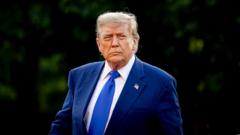Can Trump Convince the Supreme Court to Approve Billions in Foreign Aid Cuts?

Published: 2025-09-08 16:14:04 | Category: wales
The Trump administration is seeking to withhold over $4 billion in foreign aid, arguing that the President should have the authority to cancel funds previously allocated by Congress. Following a ruling that mandated spending these funds, the administration has turned to the Supreme Court for an emergency order to reverse this decision. This unprecedented legal move highlights the ongoing tension between the Executive Branch and Congress regarding foreign assistance programmes.
Last updated: 04 October 2023 (BST)
Key Takeaways
- The Trump administration is attempting to withhold $4 billion in foreign aid previously allocated by Congress.
- A lower court ruled the administration must spend the money, prompting the appeal to the Supreme Court.
- This action marks a significant moment in the balance of power between the President and Congress.
- The case highlights ongoing disputes over foreign aid and the President's budgetary authority.
- Nonprofits and businesses dependent on foreign aid funding have initiated legal challenges against this move.
The Legal Background
The recent legal battle revolves around the Trump administration's desire to withdraw funding from foreign assistance programmes. This comes in the wake of a ruling by Judge Amir Ali, who stated that the government is obliged to spend the allocated funds unless Congress specifically approves the cancellation. The administration contends that adhering to this ruling undermines the President's ability to direct foreign policy effectively.
Impoundment Control Act: A Key Factor
In his efforts to rescind foreign aid, President Trump is invoking the Impoundment Control Act of 1974. This legislation grants the President the power to request the cancellation of funds that Congress has already approved. However, the use of this power is tightly regulated, and typically requires Congress to act within a specified timeframe. Trump's administration has been accused of using this mechanism to circumvent legislative oversight by giving late notice of fund cancellations, thereby limiting Congress's ability to respond.
Previous Court Rulings
Last week, an appeals court upheld the lower court's injunction, reinforcing the idea that the President cannot unilaterally decide to withhold funds allocated by Congress. This decision aligns with the constitutional principle of separation of powers, which is designed to prevent any one branch of government from overstepping its authority.
The Supreme Court's Role
The Supreme Court's involvement in this matter is crucial. The court could establish a precedent regarding the extent of presidential authority over foreign aid. The administration's request for an emergency order aims to halt the enforcement of the lower court's ruling while the case is pending. A ruling from the Supreme Court could come at any time, making the situation highly dynamic.
Financial Implications
The funds in question include approximately £3 billion for the US Agency for International Development (USAID), as well as allocations for the State Department and international peacekeeping efforts. Trump's administration has expressed that many of these aid programmes do not align with its objectives, leading to the significant reductions. The financial implications of withholding such aid could have far-reaching effects on international relations and domestic organisations dependent on these funds.
Responses from Nonprofits and Aid Groups
A coalition of nonprofits and businesses that benefit from these foreign assistance programmes has filed legal challenges against the administration's actions. They argue that the cancellation of funds could jeopardise crucial humanitarian efforts and development projects in various regions. This legal pushback illustrates the potential consequences of altering foreign aid allocations and the complexity of navigating the legal landscape surrounding budgetary decisions.
Historical Context
This scenario represents a rare instance in which a sitting president has sought to unilaterally rescind such significant portions of foreign aid. It has been nearly fifty years since a similar action has been attempted, underscoring the unusual nature of this case. The historical context is essential for understanding the implications of this legal battle, as it could redefine the relationship between Congress and the Executive Branch.
Previous Supreme Court Cases on Foreign Aid
This is not the first time the Supreme Court has been involved in disputes over foreign aid. Earlier this year, the Court ruled 5-4 against President Trump’s attempt to keep $2 billion in foreign aid frozen during the legal proceedings. Such cases typically highlight the ongoing struggle between legislative intent and executive authority, making the current case particularly significant.
What Happens Next?
The outcome of the Supreme Court's decision will have lasting implications for the balance of power in the US government. Should the Court side with the Trump administration, it could set a precedent that allows future presidents to more easily withdraw funds allocated by Congress. Conversely, a ruling against the administration could reinforce Congress's authority over federal spending and foreign aid allocations.
Public and Political Reactions
The political ramifications of this case extend beyond the courtroom. Various stakeholders, including lawmakers, advocacy groups, and international partners, are closely watching the developments. The administration's stance may galvanise both supporters and opponents, influencing public perception of foreign aid and the role of the President in determining foreign policy.
Conclusion
The ongoing legal battle over the Trump administration's attempt to withhold billions in foreign aid encapsulates a critical issue regarding the separation of powers in the US government. As the Supreme Court prepares to weigh in, the implications of their ruling could reshape the landscape of foreign aid and the authority of the Executive Branch. The tension between the President and Congress continues to evolve, raising questions about the future of US foreign policy and its alignment with legislative priorities.
As this situation unfolds, how will the balance of power between the President and Congress adapt to the challenges posed by the modern political landscape? #ForeignAid #SeparationOfPowers #TrumpAdministration
FAQs
What is the Impoundment Control Act?
The Impoundment Control Act of 1974 allows the President to request the cancellation of funds approved by Congress. This act aims to ensure congressional oversight of federal spending and prevent unilateral funding cuts.
How have nonprofits responded to the proposed withholding of aid?
A coalition of nonprofits and businesses has filed legal challenges against the Trump administration's efforts to rescind foreign aid, arguing that it jeopardises critical humanitarian and development projects.
What could happen if the Supreme Court sides with the Trump administration?
If the Supreme Court rules in favour of the administration, it may set a precedent allowing future presidents greater latitude to unilaterally withdraw foreign aid funds, impacting the legislative power of Congress.
Has this situation occurred before in US history?
This is one of the first significant instances in nearly fifty years where a president has sought to unilaterally withdraw such large amounts of foreign aid, highlighting the unique nature of the current legal battle.
What are the financial implications of withholding foreign aid?
Withholding foreign aid could have substantial effects on international relations, humanitarian efforts, and development projects, particularly for regions that rely heavily on US assistance for stability and growth.



